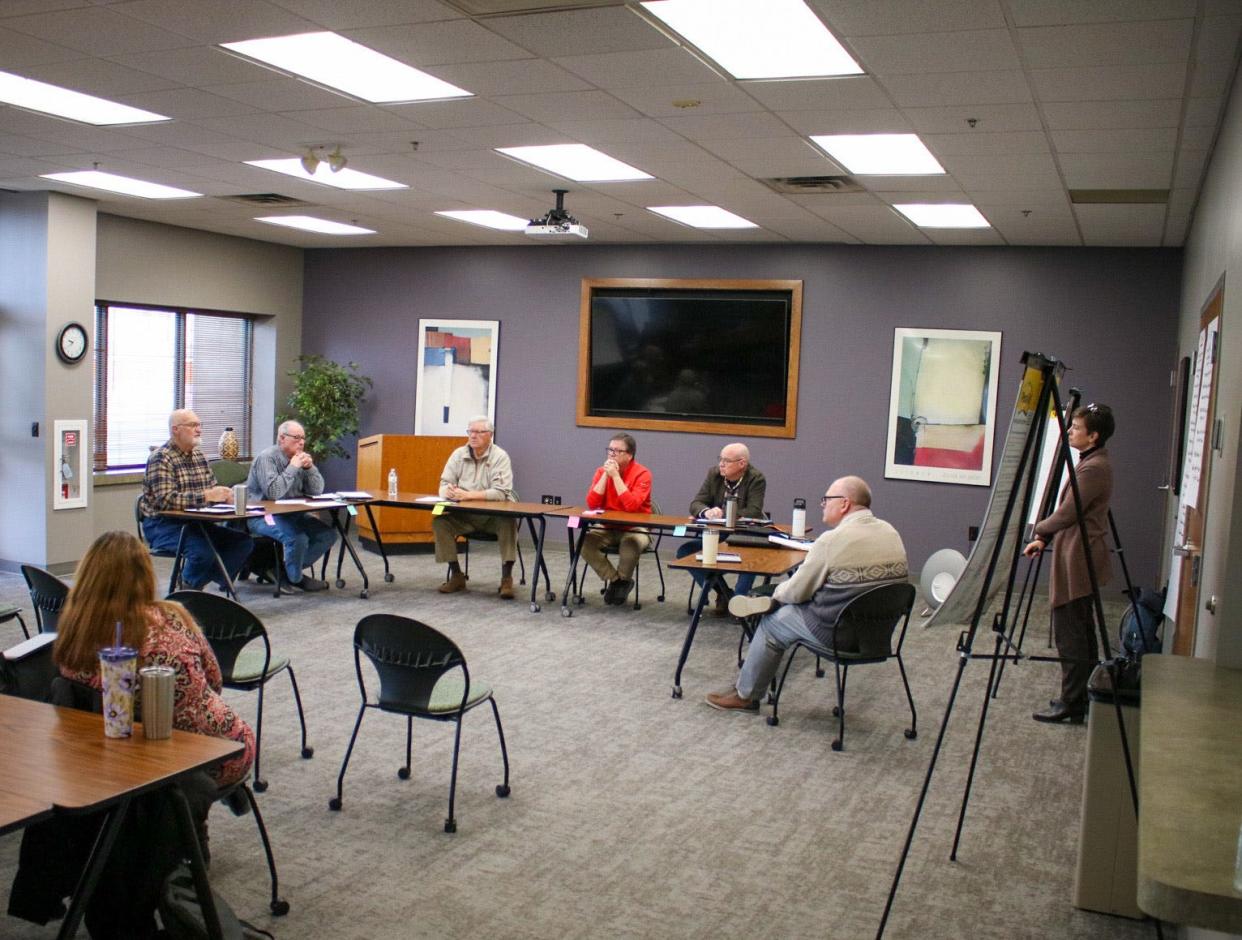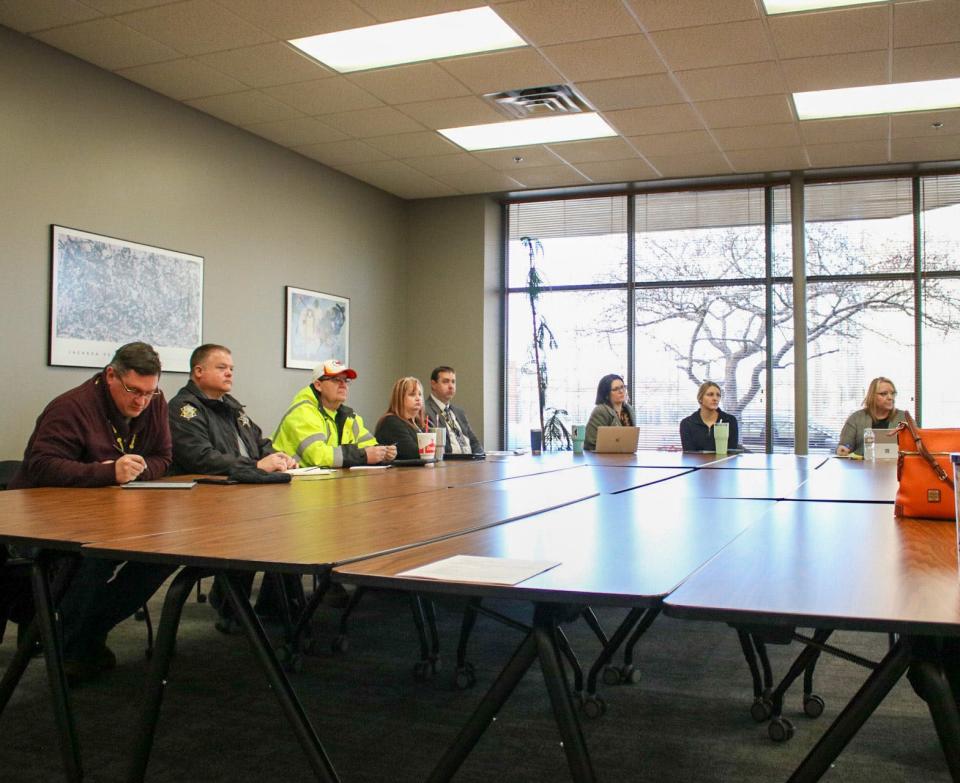Saline County sets sights on future, eyes culture shift in local government

A three-hour work session went on to spell out what the Saline County Commissioners want to work on and provide to the community during their tenure. They honed in on key focus areas which encompass different goals, each working toward a broader discussion Tuesday about the culture of local government in Saline County.
Five key focus areas the commission collectively agreed upon include: county workforce, communication and outreach, working relationships, physical and economic health, and service and infrastructure.
In place of a regular meeting this week, the Saline County Commission refined and finalized a vision for their work centering around those focus areas.
Michelle Furguson, vice president of The Novak Consulting Group, led the conversation. Her company, a part of Raftelis, works with local governments by facilitating strategic planning.
“We are going to spend some time really talking about your vision, thoughts and ideas you have about what’s important for this community,” Furguson said.
Casting a vision for the future
The purpose of the informal conversation Tuesday was not to vote on anything or propose measures, but for the commission to come to a consensus on the overarching vision for their work.
It laid out a local government vision board, of sorts, identifying key priorities Saline County has in the next couple years. Through the conversation, several ideas were passed around commissioners and county department heads on what progress might look like.
Here are some of the highlights from their discussion.
County workforce
A big talking point was the local workforce and efforts in making Saline County a desirable employer.
The commission also discussed what brings potential private sector employers into Saline County and what makes them leave or want to work elsewhere.
After a wage study was conducted at the end of 2021, Saline County approved a pay increase for all its employees last fall, set to begin this past January.
All county staff saw at least a 2.5% pay raise to meet current market standards for wages, while the majority of staff saw a 5% raise.
The conversation Tuesday built upon these improvements, with county staff recognizing that for many, a desirable place of employment goes beyond a wage.
“Before (the wage increase) we really weren’t a desirable place to work,” said Marilyn Leamer, human resources director for Saline County.
Department heads also weighed in on the issue. Michelle Weis, emergency management director, said she has seen progress, but that there is always room for improvement.
“I would like to see a bigger emphasis on management culture,” Weis said. “I think when we talk about retention of employees… I think a lot of us would argue, and as the youngest person probably in this room, I will say that I will work for less knowing that my managers care about me as a person and they want to see my development and my success.”
The commissioners seemed to recognize this trend and voiced a concern for wanting to see more done to retain and attract talent.
A general theme throughout their discussion, too, was an appreciation for progress already made.
Commissioners Bob Vidricksen and Monte Shadwick said they noticed a culture shift from what could perhaps be defined more as a ‘good ol’ boy’ system to professionalism throughout the county.
The commission's involvement in the community, sitting in on various board meetings, and focus on transparency and communication means all the difference in that regard, Shadwick noted.
“I dare say that none of you probably would have been willing to step up and say something against what one of the commissioners thought, six or seven years ago,” Vidricksen said to the department heads in attendance Tuesday. “And I feel like you all, now, feel like you can do that… that you can give us some expectations… I hope that continues.”
Saline County's workforce issues:How recruiting young people can help Salina's workforce gap
Communication and outreach
“I think what I want to take from today, not only for the commission but also for staff, is clarity,” Commissioner Jim Weese said. “Clarity in our path forward.”
Weese’s initial remarks Tuesday set the tone for a discussion about public perception and broader education about Saline County government operations.
Both the commission and department heads voiced concerns about misinformation or lack of information altogether about the goings-on of the commission and county offices.
In response, the county has been making a concerted effort to provide information to members of the community on county government involvement, business and programs.
The county has hired a new public information officer, Melissa McCoy, as a leader in these efforts.
“It does help for the public to know that we are attending these (community board meetings),” said Commissioner Joe Hay. “I mean, they see us an hour a week… they need to also know we are hitting the fair board, we are hitting the health department and Brookville City Commission meetings.” Building stronger media and community relations as a whole is a top priority the commission outlined Tuesday.
Meet Commissioner Joe Hay:Saline County Commission reorganizes, welcomes new face to start new year
Working relationships
Attending area meetings is one way the commission hopes to help their existing partners realize they are important and valued members of the community, Weese said Tuesday.
Maintaining these relationships with the city of Salina, the Salina Area Chamber of Commerce, the Salina Airport Authority, and a plethora of other entities remains a priority for Saline County.
Commissioners Roger Sparks, Shadwick, and Weese talked about how, through this vision, public and private entities can work toward a common goal. The foremost of which include housing and childcare.
It’s no secret that Saline County communities are experiencing a shortage of available living spaces. But there are projects in the work to address them.
Local housing crisis:Could new rental properties help with Salina's housing issues?
One thing the five commissioners and county department heads scratched their heads at for some time Tuesday was the lack of available childcare for employees in the county.
The culmination of limited options for housing and childcare, they recognize, has created a roadblock for employees making their way to Saline County.
It’s an issue the county would like to explore more options toward addressing, perhaps through its partners, Shadwick suggested.
"That would be a role that 25 years ago, county governments would say 'you're concerned with childcare?'" Shadwick said. "But it's a big deal now."

Physical and economic health
The commission had a similar meeting in 2021, where they casted a vision for the future of Saline County government. It was amid the downturn of the COVID-19 pandemic, where the issue of public health became elevated and economic outlook was meager.
They kept this key focus area in the wake of another crisis — opioids.
The commission discussed the rise in news regarding fentanyl overdoses, and the uncertain data on its local effects with Jason Tiller, director of the Saline County Health Department.
Economic health, of course, has many layers. But the commission briefly discussed the sustainability of projects after American Rescue Plan Act monies run out and local taxation.
Service and Infrastructure
Tuesday's informal conversation was focused on creating a vision for the future. Part of that was about how improvements now can influence further improvements down the road.
"What do we look at and dream of doing... what is the long-term of something like that... building for down the road," Sparks said.
While infrastructure such as roads and bridges are assessed yearly, buildings get less attention, Sparks pointed out.
Among other building-related infrastructure, the commissioners discussed how the state's mandate of two new judges have forced space constraints in areas that house county departments. They talked about how they have already worked to alleviate this issue, and if additional building infrastructure could be an option in the near future.
Kendrick Calfee has been a reporter with the Salina Journal since 2022, primarily focusing on county government and education. You can reach him at kcalfee@gannett.com or on Twitter @calfee_kc.
This article originally appeared on Salina Journal: Saline County eyes culture shift, sets focus for years to come

